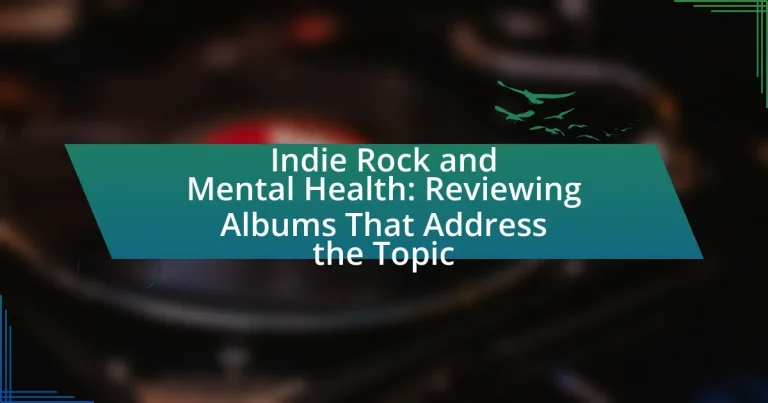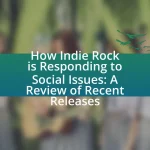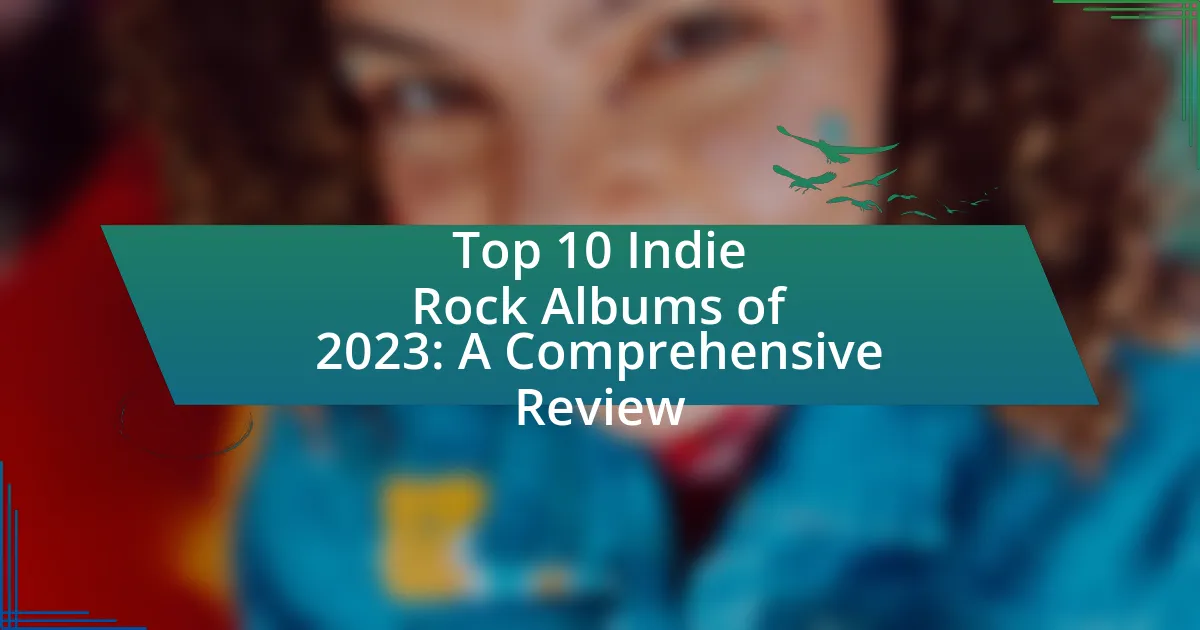The article examines the relationship between Indie Rock and mental health, highlighting how the genre serves as a platform for artists to express personal struggles with issues such as depression, anxiety, and existential crises. It discusses key albums that address these themes, including “The Suburbs” by Arcade Fire and “Carrie & Lowell” by Sufjan Stevens, and analyzes how lyrics reflect mental health struggles. The article also explores the historical context of mental health themes in Indie Rock, the societal factors contributing to this focus, and the therapeutic benefits of engaging with the music. Additionally, it emphasizes the role of fan communities in supporting mental health discussions and provides resources for individuals seeking help related to these themes.
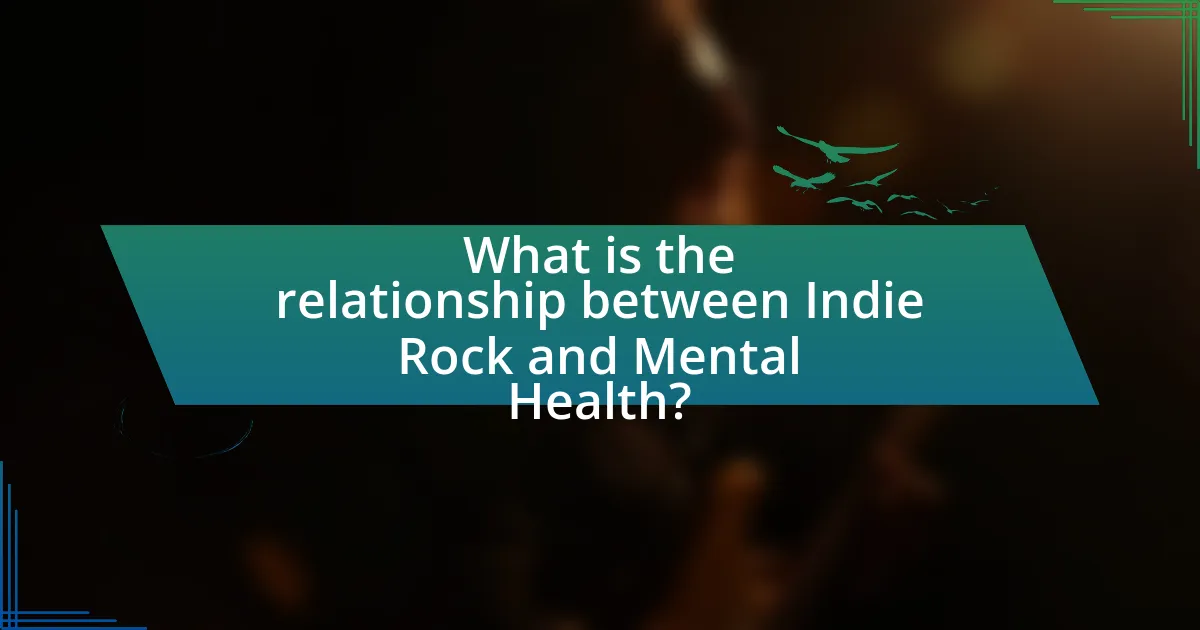
What is the relationship between Indie Rock and Mental Health?
Indie Rock often explores themes related to mental health, serving as a medium for artists to express personal struggles and societal issues. Many Indie Rock songs address topics such as depression, anxiety, and existential crises, reflecting the emotional experiences of both the artists and their listeners. For instance, albums like “The Suburbs” by Arcade Fire and “In the Aeroplane Over the Sea” by Neutral Milk Hotel delve into feelings of isolation and introspection, resonating with audiences who may face similar challenges. Research indicates that music, including Indie Rock, can have therapeutic effects, helping individuals process emotions and cope with mental health issues. This connection highlights the significant role Indie Rock plays in fostering dialogue around mental health and providing solace to those affected.
How has Indie Rock historically addressed mental health themes?
Indie Rock has historically addressed mental health themes through introspective lyrics and emotional authenticity, often reflecting personal struggles with anxiety, depression, and existential crises. Artists like Elliott Smith and Radiohead have prominently explored these themes, with Smith’s album “Either/Or” delving into feelings of isolation and despair, while Radiohead’s “OK Computer” critiques modern alienation and anxiety. Additionally, the genre has provided a platform for artists to openly discuss mental health issues, contributing to a broader cultural conversation and reducing stigma. This engagement is evident in the rise of bands like The National, whose lyrics frequently tackle themes of anxiety and depression, further solidifying Indie Rock’s role in addressing mental health.
What are some key albums that highlight mental health issues in Indie Rock?
Key albums that highlight mental health issues in Indie Rock include “The Suburbs” by Arcade Fire, which explores themes of anxiety and existential dread, and “Carrie & Lowell” by Sufjan Stevens, reflecting on grief and depression. Additionally, “In the Aeroplane Over the Sea” by Neutral Milk Hotel addresses themes of loss and mental turmoil, while “A Moon Shaped Pool” by Radiohead delves into feelings of isolation and despair. These albums are recognized for their poignant lyrics and emotional depth, effectively capturing the complexities of mental health experiences.
How do lyrics in Indie Rock reflect mental health struggles?
Lyrics in Indie Rock often reflect mental health struggles by addressing themes of anxiety, depression, and existential crises. Artists like Phoebe Bridgers and Sufjan Stevens use personal narratives and emotional vulnerability in their lyrics to convey feelings of isolation and despair, resonating with listeners who experience similar challenges. For instance, Bridgers’ song “Motion Sickness” explores the complexities of emotional turmoil and relationships, while Stevens’ “Fourth of July” poignantly addresses grief and loss. These examples illustrate how Indie Rock serves as a medium for expressing and processing mental health issues, fostering a sense of connection and understanding among audiences.
Why is mental health a significant topic in Indie Rock music?
Mental health is a significant topic in Indie Rock music because it resonates deeply with the genre’s themes of introspection and emotional authenticity. Many Indie Rock artists explore personal struggles, anxiety, and depression in their lyrics, reflecting the lived experiences of their audience. For instance, albums like “The Suburbs” by Arcade Fire and “Carrie & Lowell” by Sufjan Stevens explicitly address mental health issues, illustrating how these themes can foster connection and understanding among listeners. This focus on mental health not only provides a platform for dialogue but also helps to destigmatize these experiences, making them more relatable and accessible to fans.
What societal factors contribute to the focus on mental health in Indie Rock?
The societal factors contributing to the focus on mental health in Indie Rock include increased awareness of mental health issues, the rise of social media, and a cultural shift towards vulnerability in artistic expression. Increased awareness has led to more open discussions about mental health, encouraging artists to address these themes in their music. Social media platforms allow for the rapid sharing of personal experiences, fostering a community where mental health topics are normalized. Additionally, the cultural shift towards valuing authenticity and emotional honesty in art has prompted Indie Rock musicians to explore their mental health struggles, resonating with audiences who seek relatable content.
How do artists use their platform to discuss mental health?
Artists use their platform to discuss mental health by incorporating personal experiences and themes related to mental health into their music and public narratives. For instance, many indie rock artists openly share their struggles with anxiety, depression, and other mental health issues through lyrics, interviews, and social media, fostering a sense of community and understanding among listeners. This approach not only raises awareness but also encourages dialogue about mental health, as seen in albums like “The Suburbs” by Arcade Fire, which addresses feelings of isolation and existential dread. Additionally, artists often collaborate with mental health organizations, using their influence to promote resources and support systems, thereby validating the importance of mental health discussions in society.
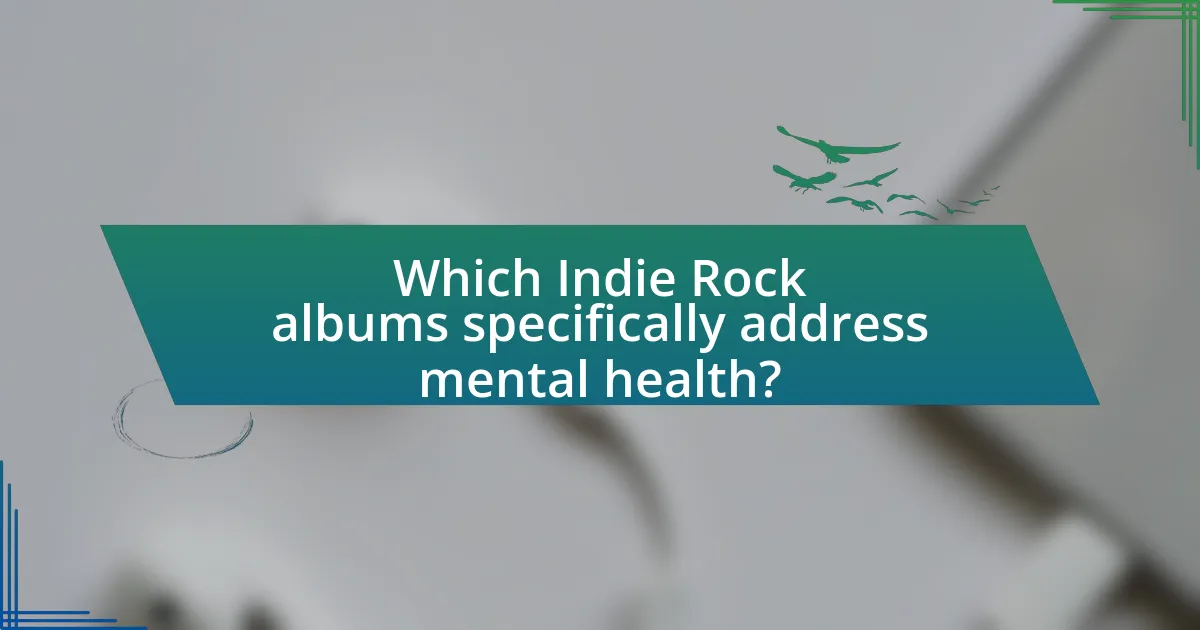
Which Indie Rock albums specifically address mental health?
Indie Rock albums that specifically address mental health include “The Suburbs” by Arcade Fire, which explores themes of anxiety and existential dread, and “Mental Illness” by Aimee Mann, which directly tackles depression and emotional struggles. Additionally, “In the Aeroplane Over the Sea” by Neutral Milk Hotel delves into grief and loss, while “The Glow Pt. 2” by The Microphones reflects on isolation and mental turmoil. These albums are recognized for their lyrical content that resonates with listeners facing similar mental health challenges.
What are the most impactful Indie Rock albums related to mental health?
The most impactful Indie Rock albums related to mental health include “The Suburbs” by Arcade Fire, “In the Aeroplane Over the Sea” by Neutral Milk Hotel, and “Carrie & Lowell” by Sufjan Stevens. “The Suburbs” explores themes of isolation and existential dread, reflecting on the pressures of suburban life and personal identity. Neutral Milk Hotel’s “In the Aeroplane Over the Sea” addresses grief and loss, inspired by the life of Anne Frank, which resonates deeply with listeners facing similar emotional struggles. Sufjan Stevens’ “Carrie & Lowell” delves into the complexities of family relationships and the impact of loss, providing a raw and honest portrayal of mental health challenges. These albums have been recognized for their profound lyrical content and emotional depth, making significant contributions to discussions around mental health in the Indie Rock genre.
How do the themes of these albums resonate with listeners?
The themes of these albums resonate with listeners by addressing personal struggles and emotional experiences related to mental health. Many listeners find solace and validation in the lyrics, which often reflect feelings of anxiety, depression, and self-discovery. For instance, albums like “The Suburbs” by Arcade Fire explore themes of isolation and nostalgia, allowing listeners to connect their own experiences with the narrative presented. This connection is supported by research indicating that music can serve as a therapeutic tool, helping individuals process their emotions and experiences, as noted in the study “The Role of Music in Mental Health” published in the Journal of Music Therapy.
What critical reception have these albums received regarding their mental health themes?
Albums addressing mental health themes in indie rock have generally received positive critical reception, with many reviewers praising their authenticity and emotional depth. Critics often highlight how these albums effectively articulate struggles with mental health, resonating with listeners on a personal level. For instance, albums like “Mental Illness” by Aimee Mann and “The Suburbs” by Arcade Fire have been noted for their poignant exploration of anxiety and existential dread, earning accolades for their lyrical honesty and relatability. Publications such as Pitchfork and Rolling Stone have emphasized the importance of these themes in fostering dialogue around mental health, further validating the albums’ impact and relevance in contemporary music.
How do different artists approach mental health in their music?
Different artists approach mental health in their music by using personal narratives, emotional vulnerability, and diverse musical styles to convey their experiences. For instance, artists like Phoebe Bridgers and Sufjan Stevens incorporate introspective lyrics that explore themes of anxiety and depression, creating a relatable connection with listeners. Additionally, bands such as The National often use melancholic melodies and reflective lyrics to address feelings of isolation and existential dread. This approach not only fosters a sense of community among fans but also raises awareness about mental health issues, as evidenced by the increasing number of discussions surrounding mental health in music forums and interviews.
What unique perspectives do various Indie Rock artists bring to mental health topics?
Various Indie Rock artists bring diverse perspectives to mental health topics, often reflecting personal experiences and societal issues. For instance, artists like Phoebe Bridgers openly discuss themes of anxiety and depression in her lyrics, providing listeners with relatable narratives that destigmatize mental health struggles. Similarly, Sufjan Stevens addresses grief and existential crises in his work, offering a contemplative approach that resonates with those facing similar challenges. Additionally, the band Death Cab for Cutie explores themes of loss and emotional turmoil, emphasizing the importance of vulnerability in their music. These artists contribute to a broader conversation about mental health, encouraging openness and understanding through their unique storytelling and emotional honesty.
How do collaborations in Indie Rock influence the portrayal of mental health?
Collaborations in Indie Rock significantly enhance the portrayal of mental health by combining diverse artistic perspectives and experiences. This fusion allows for a richer exploration of mental health themes, as artists share personal narratives and emotional struggles, creating a more relatable and nuanced representation. For instance, the collaboration between artists like Sufjan Stevens and Angelo De Augustine on the album “A Beginner’s Mind” delves into themes of anxiety and existential reflection, showcasing how collaborative efforts can amplify the emotional depth of mental health discussions. Such partnerships often lead to innovative soundscapes and lyrical content that resonate with listeners, making mental health issues more accessible and understood within the Indie Rock genre.
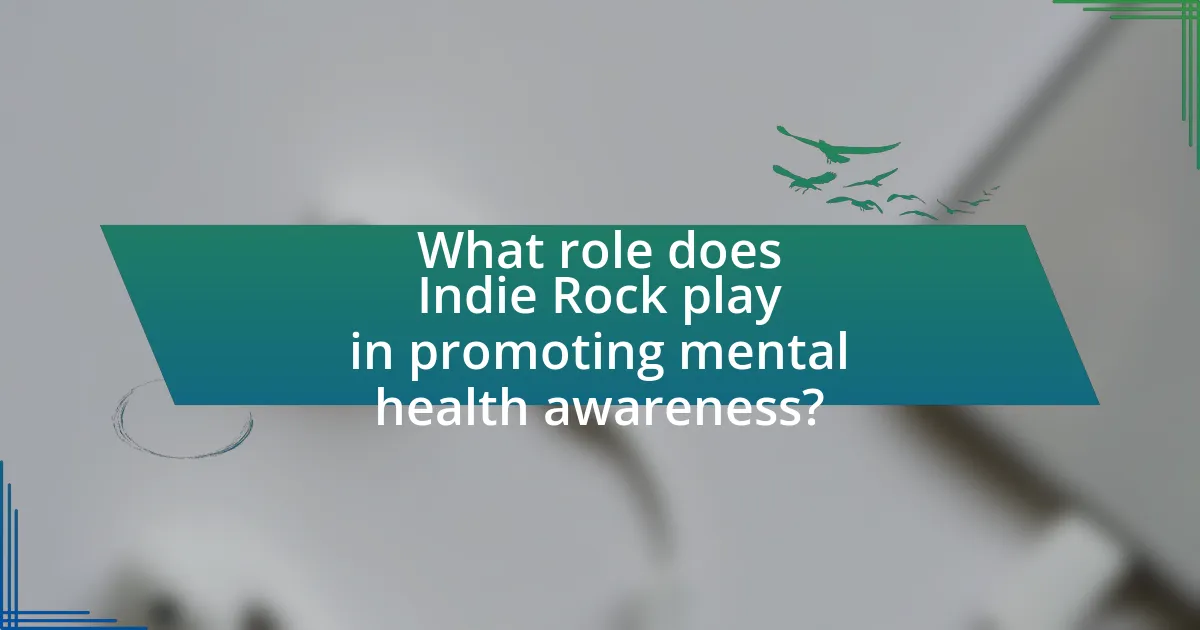
What role does Indie Rock play in promoting mental health awareness?
Indie Rock plays a significant role in promoting mental health awareness by addressing personal struggles and emotional experiences through its lyrics and themes. Many Indie Rock artists openly discuss mental health issues, such as depression and anxiety, in their music, which helps to destigmatize these topics and encourages listeners to engage in conversations about mental well-being. For example, the album “Mental Illness” by Aimee Mann explores themes of depression and isolation, providing listeners with relatable narratives that foster understanding and empathy. This genre’s emphasis on authenticity and vulnerability allows artists to connect with audiences on a deeper level, ultimately contributing to a broader cultural dialogue about mental health.
How can listening to Indie Rock music impact mental health positively?
Listening to Indie Rock music can positively impact mental health by providing emotional expression and fostering a sense of connection. The genre often explores themes of introspection, identity, and personal struggles, which can resonate with listeners, helping them process their own emotions. Research indicates that music can stimulate the release of dopamine, a neurotransmitter associated with pleasure and reward, enhancing mood and reducing feelings of anxiety and depression. For instance, a study published in the Journal of Positive Psychology found that engaging with music, including genres like Indie Rock, can lead to increased feelings of happiness and decreased stress levels.
What therapeutic benefits can be derived from engaging with Indie Rock music?
Engaging with Indie Rock music can provide therapeutic benefits such as emotional expression, stress relief, and enhanced mood. The genre often features relatable lyrics that resonate with listeners, allowing them to process their feelings and experiences. Research indicates that music can activate brain regions associated with emotion regulation, leading to improved mental well-being. For instance, a study published in the Journal of Music Therapy found that participants who listened to music, including Indie Rock, reported lower levels of anxiety and depression. This evidence supports the notion that Indie Rock music can serve as a valuable tool for emotional healing and mental health support.
How do fan communities around Indie Rock support mental health discussions?
Fan communities around Indie Rock support mental health discussions by creating safe spaces for open dialogue and sharing personal experiences. These communities often utilize social media platforms and forums to facilitate conversations about mental health, allowing fans to connect over shared struggles and the emotional impact of music. For instance, many Indie Rock artists openly discuss their own mental health challenges, which encourages fans to do the same, fostering a culture of vulnerability and support. Research indicates that music can serve as a therapeutic tool, and the communal aspect of fan interactions enhances this effect by providing a sense of belonging and understanding among individuals facing similar issues.
What are some best practices for exploring mental health through Indie Rock?
Best practices for exploring mental health through Indie Rock include actively listening to lyrics that address mental health themes, engaging with artists who openly discuss their struggles, and participating in community discussions around the music. Analyzing lyrics from albums like “The Suburbs” by Arcade Fire, which reflects on themes of isolation and anxiety, provides insight into the emotional landscape of mental health. Additionally, attending live performances can foster a sense of connection and understanding among fans, as seen in the communal experiences at concerts by bands like Death Cab for Cutie, known for their introspective lyrics. These practices not only enhance personal understanding but also contribute to broader conversations about mental health in society.
How can listeners find comfort and connection in Indie Rock music?
Listeners can find comfort and connection in Indie Rock music through its relatable lyrics and emotional authenticity. The genre often explores themes of personal struggle, love, and existential reflection, allowing listeners to resonate with the experiences conveyed by the artists. For instance, studies have shown that music with emotional depth can enhance feelings of empathy and understanding, fostering a sense of community among fans. Additionally, the DIY ethos of Indie Rock promotes a sense of belonging, as fans often feel connected to the artists and each other through shared experiences and values.
What resources are available for those seeking help related to mental health themes in music?
Resources available for those seeking help related to mental health themes in music include mental health hotlines, online support groups, and music therapy programs. Mental health hotlines, such as the National Suicide Prevention Lifeline, provide immediate support and guidance for individuals in crisis. Online support groups, like those found on platforms such as Reddit or specialized forums, allow individuals to share experiences and find community among others who relate to mental health themes in music. Additionally, music therapy programs, which are often offered by licensed therapists, utilize music as a therapeutic tool to address emotional and psychological issues, helping individuals process their feelings through musical expression. These resources collectively support individuals in navigating their mental health challenges while engaging with music.
